The HP S700 And S700 Pro SSD Review
by Billy Tallis on September 7, 2017 9:00 AM ESTMixed Random Performance
Our test of mixed random reads and writes covers mixes varying from pure reads to pure writes at 10% increments. Each mix is tested for up to 1 minute or 32GB of data transferred. The test is conducted with a queue depth of 4, and is limited to a 64GB span of the drive. In between each mix, the drive is given idle time of up to one minute so that the overall duty cycle is 50%.
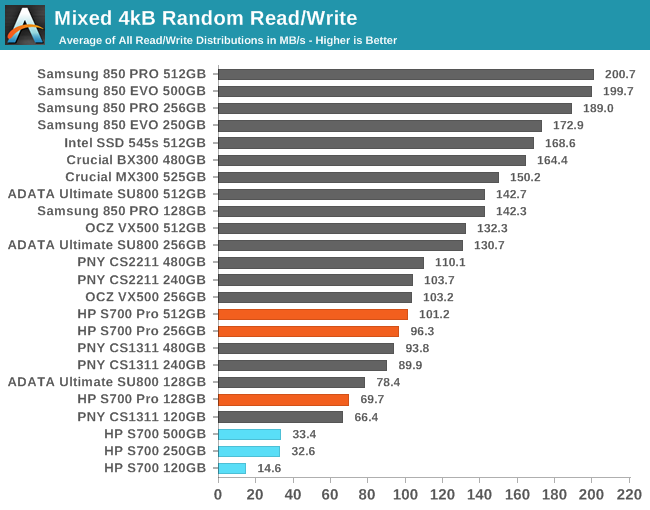
The mixed random I/O performance of the larger S700 Pros is below average, and also slower than the ADATA SU800 in specific. The S700s are the slowest of all, with the larger two offering half the performance of the slowest SSD with DRAM, and the 120GB S700 being less than half as fast as its larger siblings.
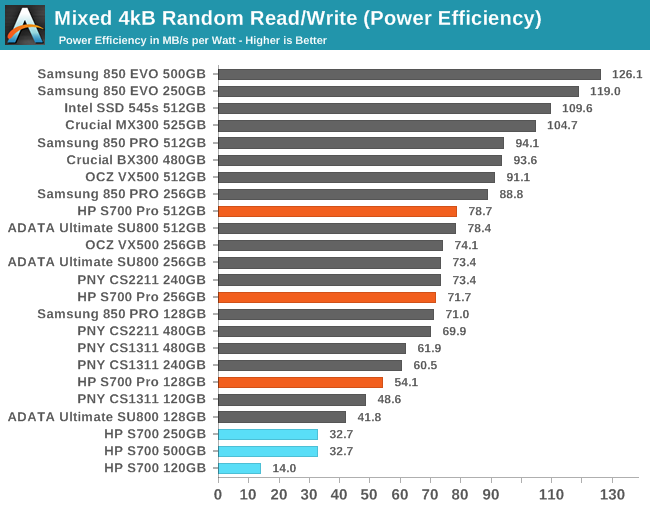
The power efficiency scores of the HP S700 aren't quite as bad as the performance scores, but it's still at the bottom of the chart and clearly worse than any SSD with DRAM. The S700 Pro is pretty efficient for a TLC-based drive, but is beat by the Crucial MX300 and Samsung 850 EVO.
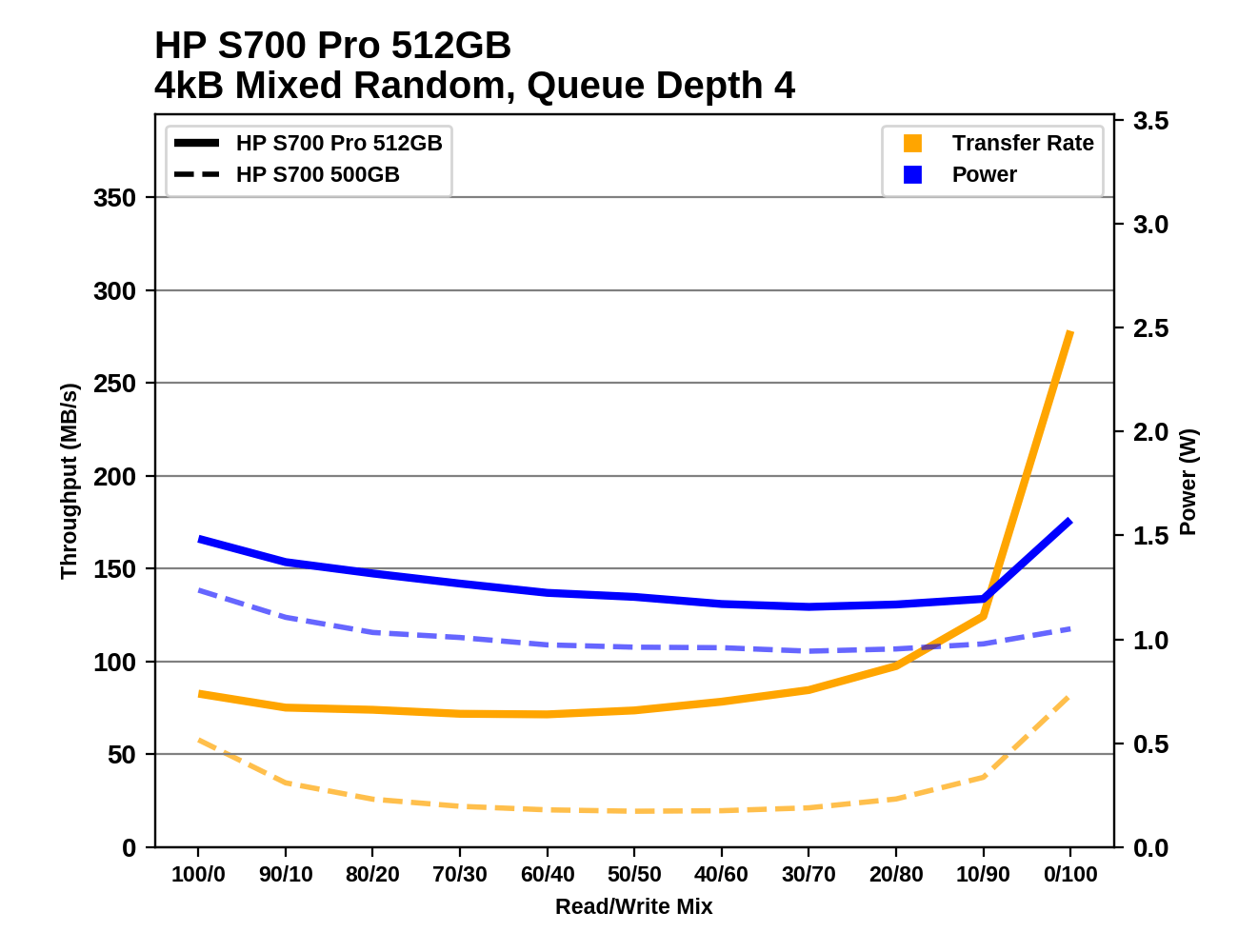 |
|||||||||
The performance of the S700 Pro only drops a little bit during the early phases of the mixed random I/O test, then rebounds gradually before spiking at the very end when every operation is a cacheable write. The 128GB S700 Pro runs out of SLC write cache space before the test is over and doesn't show the same peak in performance (though the spike in power consumption reveals the background work happening). The S700s start out slow, lose proportionally more of their performance in the early phases of the test, and only experience a small peak in performance at the end when every operation is a write.
Mixed Sequential Performance
Our test of mixed sequential reads and writes differs from the mixed random I/O test by performing 128kB sequential accesses rather than 4kB accesses at random locations, and the sequential test is conducted at queue depth 1. The range of mixes tested is the same, and the timing and limits on data transfers are also the same as above.
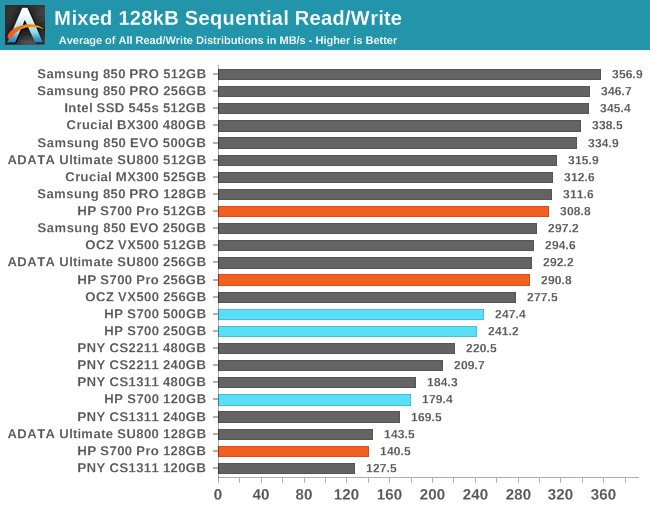
The mixed sequential I/O performance of the larger two HP S700 Pros is decent, and thanks to their great read speed the S700 isn't too far behind. The 120GB S700 scores significantly higher than the 128GB S700 Pro.
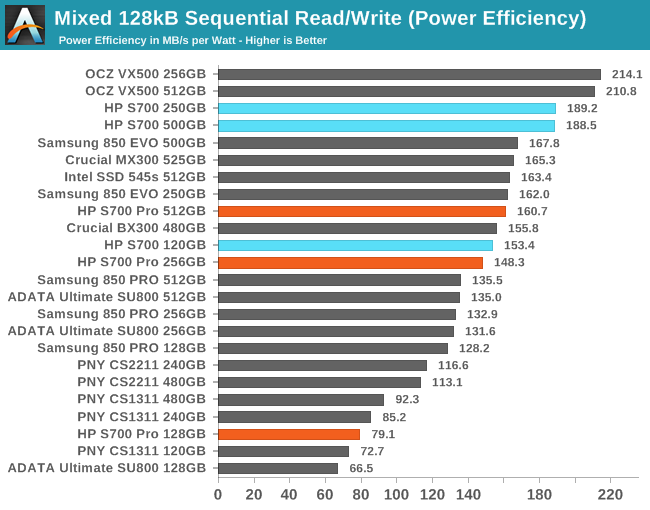
The power efficiency of the larger two S700s is great, but not quite up to the level of the OCZ VX500. The smallest S700 and the larger two S700 Pros are a bit above average in efficiency. The 128GB S700 Pro is near the bottom of the chart, but is more efficient than the SU800.
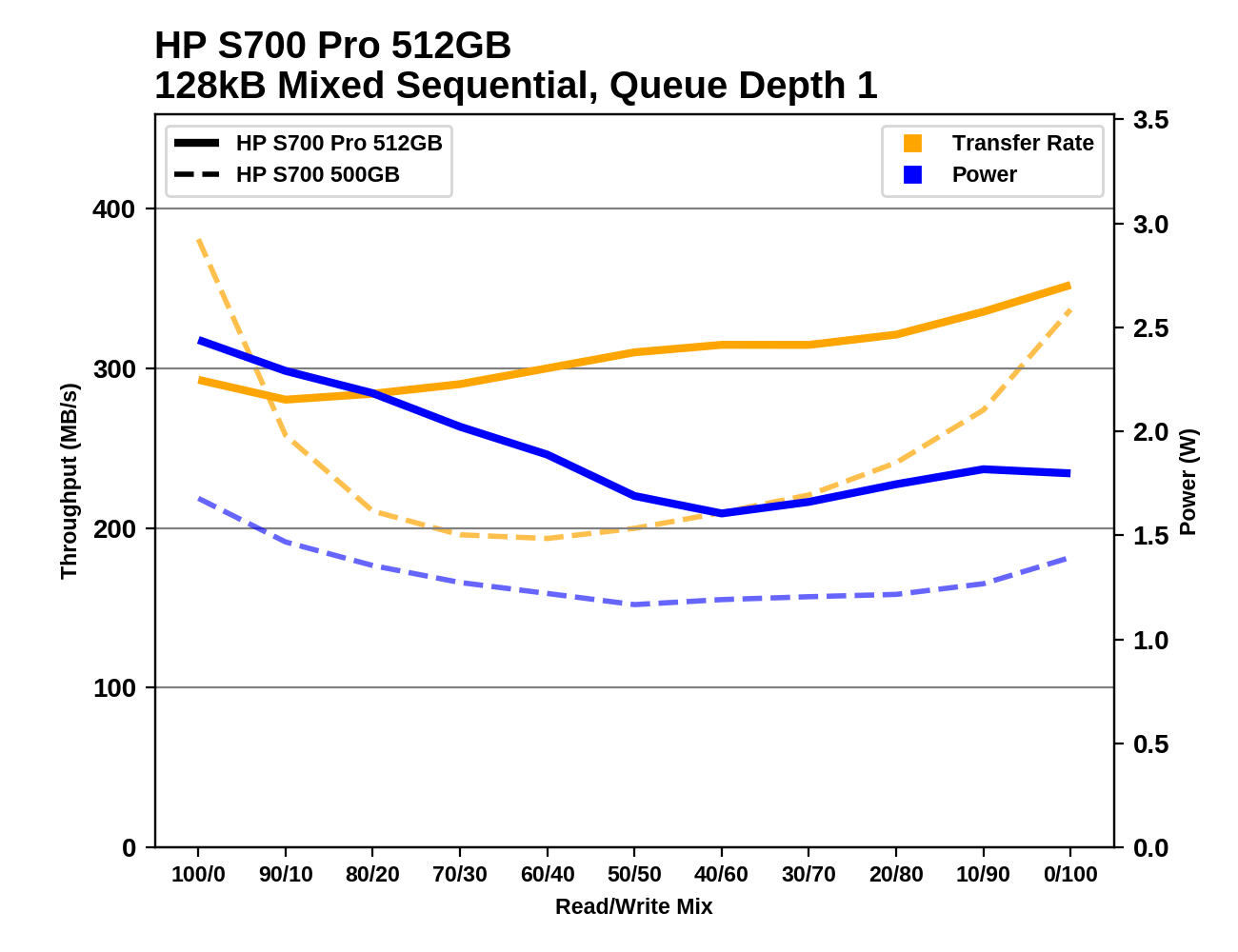 |
|||||||||
The larger two S700 Pros hardly lose any performance when writes are first introduced early in the test, and gradually speed up from there. The larger two S700s show a pronounced bathtub curve for performance, but they're fast enough at either end of the test that the overall performance is decent. The smallest two HP drives suffer from unsteady and low performance as they are performing garbage collection almost from the very beginning of the test.










54 Comments
View All Comments
sonny73n - Saturday, September 9, 2017 - link
I understand that but where it'll lead us to? Most of things cost much more in the US compared to the same in China - from gasoline to food. A Chinese can cover his living expenses with just $1000/month while it takes at least twice that much for an American. Keep on rising the minimum wage will not solve the problem because we will be left with nothing to produce. Something's really messed up here.demMind - Monday, September 11, 2017 - link
sonny.. US Companies can afford to pay wages in the US. They just don't want to because executives love their year-over-year bonuses and dividends to grow. So no, prices haven't gone up because of cost of labor, they've gone up because each of us wants as much as we can get for as little extra effort as possible.Fujikoma - Thursday, September 14, 2017 - link
The price wouldn't be that much more. That extra labor savings is balanced by less efficient use of labor, material waste, shipping costs, increased counterfeit products, higher CEO pay and stock payouts if they exist (Apple is a good one for this). When companies moved to China, they did not lower their prices from cheaper labor. They lined their pockets with the extra cash. I worked for over a decade with a major electronics manufacturer invested heavily in China. Nothing but a headache for such a slim margin. That was with a 50X price margin on one of their highest volume products compared to a 12X price margin with the Mexican produced product (selling price relative to claimed materials + labor + storage + packaging + advertising + everything else involved). The higher margin is offset by shipping, defective/poorly made product, counterfeit product and material waste from poor manufacturing setup.As to the cheaper labor, that's because the U.S. allows product made from next to slave labor AND product made in environmentally damaging conditions to be imported into this country. Why do you think China has a pollution problem (aside from coal)... less regulation compared to Europe, Canada, Japan and the U.S.
Samus - Tuesday, December 26, 2017 - link
Sonny, you realize Lenovo lost the crown 2 years ago? They held the #1 spot for 14 quarters. HP has held the #1 spot for 39 quarters since 2006 when they took it from Dell.Nobody is hurt...except the Fortune 500 companies that blindly bought into Lenovo based on price, only to have their IT dept advocate for change almost immediately. Which aligns perfectly with the 3 year corporate product cycle and the amount of time Lenovo held the #1 sales edge in North America.
I'm an IT director, I know first hand the outcry my community had over Lenovo, and not just in relation to superfish.
petar_b - Tuesday, September 12, 2017 - link
I don't stand any of these big players HP, Lenovo.... It's all rip off, Lenovo's licensing is too complicated (can't activate features you paid for on hardware that they consider obsolete) and then on HP side plenty of similar crap. You almost feel bad for asking for something you own/deserve/paid.... I love SunMicro, chenbro, clean LSI or Adaptec works with everything. What HP SSD, that one will be backed by warranty only if attached to their mobo, or whatever other stupidity...Flunk - Thursday, September 7, 2017 - link
Marketing terms are always meaningless without context. You always need to read the specs behind the glossy advertising to know what you're buying. I don't see that changing any time soon.MajGenRelativity - Thursday, September 7, 2017 - link
AgreedyankeeDDL - Thursday, September 7, 2017 - link
I'm shocked by the price. Dramless, with those specs, should be $70, top, for the 240GB.Why in the world would I spend no less than $116, when the EVO sells for $90?!?!?!
Glock24 - Thursday, September 7, 2017 - link
Just what I was thinking. Pricing on these are ridiculous. They have a bit more storage size, but so does the Crucial MX300 and it's also way cheaper and faster!Samus - Thursday, September 7, 2017 - link
The MX300 is pretty much the only economy drive to consider outside of an 850 EVO IMHO. Even if these sell for half the retail price, they aren't worth it. You can just pickup an old M500 on eBay (or even an OEM Intel 520/530) for half these prices and have similar performance.